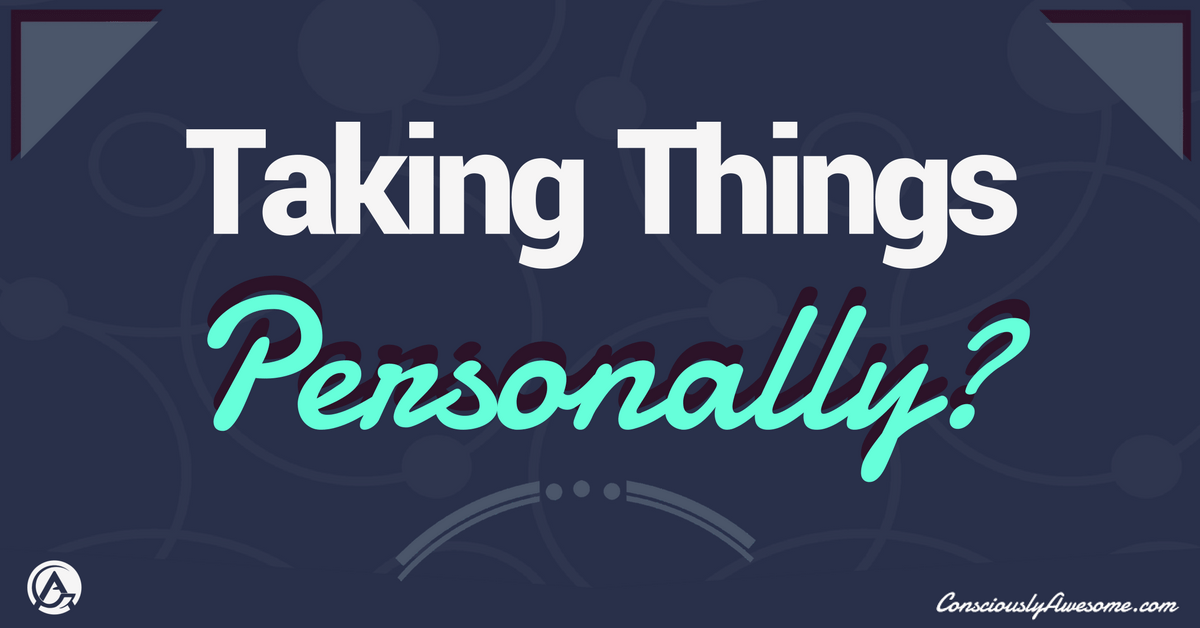
How to Stop Taking Things Personally
Heart sinking, with a deep sigh he looks away.
He feels their eyes sear into his mind, his heart, his very soul. Eyes that question his actions, doubt his abilities, and demand explanations.
“What is happening?” he thinks.
The meeting had begun so jubilantly and supportively - this team that has been so close for so long. They have had each other’s backs as they banded together against the odds. Good days, great days, tough days.
They know they can depend on each other to bring out the best and the truth in one another.
Today it is high-fives all around for jobs well-done and accomplishments realized.
“Check out that improvement!”
“This worked successfully!”
“We challenged each other and look at our results!”
“Yessss!”.
Yet slowly, as the initial celebration subsides, the imaginary fingers start pointing at him.
Curious, questioning glances at first, then blatant interrogations.
“What is that mumbo-jumbo you do?”
“Why don’t you just do what the rest of us do?”
“Why are your results different from ours?”
“Let me play devil’s advocate…”.
All prefaced with that supposedly innocuous phrase, “Don’t take this personally but…”.
“Don’t take this personally” means that someone is going to say or do something that you may interpret as negative, and that you should not let that affect how you feel about yourself.
Hhmmm, sometimes easier said than done.
When you ‘take it personally,’ you internalize their actions as part of yourself.
Which may or may not be the case.
You know what I am talking about, right?
Let’s think about this.
Why might one say ‘Don’t take this personally”?
First of all, sometimes people really do mean for you not to take it personally.
You may have said something like this yourself: I know I just got here to your party, but I need to leave in half an hour. Don’t take it personally though. It’s that my sister’s team made the play-offs and I am going to her game to cheer her on.
You know this may be interpreted as rude, that you are leaving a party so quickly, so you want your friend to know that you are not just ditching the party because you do not want to be there. Something unexpected came up and yet you also wanted to honor your previous commitment for as long as you could. In saying, “Don’t take this personally…” you are looking to clarify that, and although your action could appear offensive, that is truly not your intention.
Secondly, sometimes it is the case that, even though they are directing their actions toward you, it is they who need to take it personally.
In other words:
“Don’t take things personally. What other people say about you is their reality, not yours”
~ Don Miguel Ruiz, The Four Agreements
Yup, sometimes what people hit you with is a reflection of what they are struggling with themselves.
What are their fears? What are they battling in their daily life? Is that what they are calling you out on? Did they have a bad day? Week? Month?
Being able to lash out at you, to cast some of their unhappiness, stress and angst upon you, makes them feel safer and better. But this is their story. You do not have to believe it or own it for yourself. You have your own story.
And thirdly, sometimes there is a grain or two of truth in their assessment of you.
Again, it is their reality, but be willing to take a look at yourself and consider how much of what they are saying may hold truth. You might find that some of their opinions help you clarify your own challenges. By shining a light on these, you now have the conscious opportunity to choose and correct them or leave them be. And from that, you have a truer awareness of yourself. Sure, they could have declared it in a more courteous manner, but learning about yourself is always a good thing in the end.
Oh, and most importantly…
One significant thing to keep in mind is that in any of these situations, the opinionated person’s actions do not mean anything until you attach meaning to them. You have the power to choose how to take in these actions and how to respond. You have the choice of changing how you experience these encounters.
Example: When your teammate asks you “What is that mumbo-jumbo you do?” you have some choices.
- You can interpret it as a derogatory judgement, be hurt and offended, feeling that what you do is not the norm and therefore inferior.
- You can interpret it as curiosity, be generous and cooperative in sharing your strategies.
- You can interpret it as an accurate assessment - yes, you do need to refine a few of your strategies - and you now have the opportunity and sounding board with whom to begin improving.
Again, sometimes it is easier said than done.
Are you ready to give it a try?
Here are some strategies to experiment with when you are feeling triggered by hearing “Don’t take this personally.”
Examine your beliefs
It has been said that what we feel is determined by our interpretation of what happens around us, and our interpretation is formed by our beliefs.
For example, you accidentally bump into someone as you walk around a corner. You say “Oops, sorry!”, while your friend bumps into someone similarly and says nothing.
You believe that by acknowledging the accidental contact you are being polite and letting them know that it was not intentional. Your friend believes that if it was unintentional then there is no reason to apologize, it is just something that happened over which you had no control and you do not need to take responsibility for it.
You and your friend react differently to the same situation because of your beliefs. By examining your beliefs you can begin to stop taking things personally.
Stop handing over your power
When we do take things personally, we allow someone else to decree what we feel and believe. We are giving them more power over us than they have the right to.
Is that what you want?
Why not hold onto your power and use it to support yourself? Use it to take a deep, balancing breath. Use it to align your actions with the true situation. Use it to clarify the intentions of their actions. Use it to affirm your integrity and being.
You have way too many uses for your power to just give it away in a snap. Your power belongs to you. Hold on to it.
Recognize your vulnerabilities
Sometimes people know which buttons to push to send us over the edge and if they are in a mood to do just that, they will. When we know our personal triggers and sensitivities it becomes more difficult for others to succeed in setting them off.
Be honest with yourself and reflect on those things that make you feel vulnerable. Health? Age? Ability? Relationships? Finances?
Once you are aware of your vulnerabilities you can prepare yourself for how you would ideally like to respond if such a situation occurs.
Allow your emotions to flow
Hearing “Don’t take this personally but…” can send us on an emotional rollercoaster. Be open to feeling and acknowledging each emotion that is called into play.
Often you feel hurt, angry, confused, surprised, embarrassed, defensive, defeated, and/or unworthy.
Do not try to deny or reject these emotions. As odd as it might sound, you actually want to welcome them. Create a physical and temporal space in which to allow yourself to sit with them. Feel the hurt, acknowledge it, then let it go. Do the same for each emotion.
Once these emotions no longer serve you in this situation, let them go. Do not hold on to them. Allowing your emotions to ‘flow and go’ empowers you to move through the moment and live your life to the fullest.
Ask questions
So you’ve just been blindsided. Before you jump on the emotional rollercoaster, ask questions.
Stay calm and get clarification.
What did they really mean?
Did you misunderstand something?
Did they misunderstand something?
Do they realize how their words were interpreted by you? And the tone? Is that how they intended them to be interpreted?
Asking questions gives each of you the opportunity for clarification as to how you feel and what you understand. Sometimes a few questions can put a whole different spin on the situation.
Identify the truth
Sometimes there is truth to what is being said. As hard as it is to hear it, when we are willing to listen and reflect, we benefit from it.
When you take time to acknowledge these truths, you are empowered to be more self-aware. You make purposeful choices to improve the judgements placed upon you. You focus your energy on bettering yourself rather than spinning your wheels in a pit of negativity.
Remember, it is not always about you
Sometimes people’s judgements and criticisms are more about them than us.
When feeling confronted it is naturally easy to think it must be about you, but don’t assume that, especially if the judgements are way off-base. Consider the source, consider the big picture, and respond from that perspective.
Remember, this is their story. You do not have to believe it or be part of it. You have your own story to live.
You CAN stop taking things personally.
When you hear “Don’t take this personally but…” a whole slew of emotions and reactions cascade through your mind. Taking things personally impacts your happiness, harmony, and peace of mind.
Being prepared will help you face these situations with more confidence and less turmoil.
“There is a huge amount of freedom that comes to you when you take nothing personally.”
~ Don Miguel Ruiz, The Four Agreements
Give yourself the gift of freedom.

If the sun is shining, my Crosstrek is calling me to fill up her tank, throw open her sunroof, and head for the back-roads. With wind in my hair, I smile at everyone I see. Grace smiles back at me (even through the trees).

